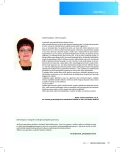-
Medical journals
- Career
Self-sufficiency and its evaluation in the context of our legislative and practice, especially in terms of care allowance assessment
Authors: I. Holmerová
Authors‘ workplace: Gerontologické centrum Praha
Published in: Geriatrie a Gerontologie 2016, 5, č. 2: 75-78
Category: Review Article
Overview
The article deals with the current issues with care allowance, in terms of care for geriatric patients. It discusses the most significant impediments of the process of evaluation of the patient’s condition. The conclusion is that some of the impediments are caused by the legislative (evaluation in the patient’s natural environment), whereas some other ones are “merely” caused by lack of cooperation from the various departments and specialities. Functional evaluation (Complex Geriatric Assessment) is a necessary basis for evaluation of the patient’s request for care allowance.
KEYWORDS:
self-sufficiency, functional evaluation, Complex Geriatric Assessment, Care Allowance
Sources
1. Burcin B, Kučera T. Prognóza populačního vývoje České republiky na období 2008–2070. Praha: Rada vláda pro seniory a stárnutí populace, 2010.
2. Kalvach Z. Geriatrické syndromy a geriatrický pacient. Praha: Grada Publishing 2008.
3. EC. Evidence on Demographic and Social Trends. Social Policies’ Contribution to Inclusion, Employment and the Economy. Brussels 2013.
4. EC. Long-term care in ageing societies – challenges and policy options. Brussels: European Commission 2013. Contract No. 41.
5. EC. Adequate social protection for long-term care needs in an ageing society. Luxembourg: Social Protection Committee and the European Commission 2014.
6. Holmerová I, Vaňková H, Wija P, Šteffl M. Pohled na geriatrického pacienta, demence a některé další geriatrické syndromy. In: Štěpánková H, Hoschl C, Vidovićová L, eds. Gerontologie – současné otázky z pohledu biomedicíny a společenských věd. Praha: Karolinum 2014 s. 77–92.
7. Průša L, Horecký J. Poskytování služeb sociální péče pro seniory v České republice a ve Švýcarsku:mezinárodní komparace. Tábor: APSS 2012.
8. BGS. Fit for Frailty – Consensus best practice guidance for the care of older people living with frailty in community and outpatient settings. London: British Geriatrics Society 2014.
9. Morley JE. Frailty: a time for action. European Geriatric Medicine 2013; 4(4): 215–216.
10. Rusina R, Matěj R. Neurodegenerativní onemocnění. Praha: Mladá fronta 2014. s. 350.
11. Pokorná A. Ošetřovatelství v geriatrii – hodnoticí nástroje. Praha: Grada Publishing 2013. s. 192.
12. Kalvach Z, Zadák Z, Jirák R. Geriatrie a gerontologie. Praha: Grada-Avicenum 2004.
13. Matson JL. Handbook of Assessment in Persons with Intellectual Disability. Baton Rouge, Lousiana: Academic Press 2007.
14. WHO. Mezinárodní klasifikace funkčních schopností, disability a zdraví. Praha: Grada Publishing a Národní rada osob se zdravotním postižením ČR.
15. Jedlinska M. Funkční hodnocení seniorů, teorie a praxe. Geri a gero 2013; 2(3): 134–137.
16. Zvonikova A, Wernerova J. Využití mezinárodní klasifikace funkčních poruch, disability a zdraví. Geri a gero 2013; 2(3):137–141.
Labels
Geriatrics General practitioner for adults Orthopaedic prosthetics
Article was published inGeriatrics and Gerontology

2016 Issue 2-
All articles in this issue
- Elderly patients with colon cancer: a medical oncologist’s perspective.
- Normotense hydrocephalus as a cause of deterioration of dementia in a geriatric patient
- Self-sufficiency and its evaluation in the context of our legislative and practice, especially in terms of care allowance assessment
- Geriatric patient in emergency department.
- Is it possible to provide integrated care in the Czech Republic? Findigns from long-term action research
- Aqua-aerobics in prevention of musculoskeletal system deterioration among elderly women
- Monitoring of influence of new cognitive training programs /COGNIPLUS/ on the level of some mental processes and on quality of life of elderly people (seniors) with a mild cognitive impairment.
- Geriatrics and Gerontology
- Journal archive
- Current issue
- Online only
- About the journal
Most read in this issue- Normotense hydrocephalus as a cause of deterioration of dementia in a geriatric patient
- Self-sufficiency and its evaluation in the context of our legislative and practice, especially in terms of care allowance assessment
- Geriatric patient in emergency department.
- Elderly patients with colon cancer: a medical oncologist’s perspective.
Login#ADS_BOTTOM_SCRIPTS#Forgotten passwordEnter the email address that you registered with. We will send you instructions on how to set a new password.
- Career

